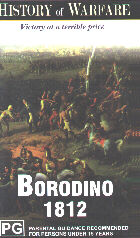 |
 |
 |
|
DOCUMENTARIES Borodino 1812
So Borodino deserves a special place in Napoleonic history and in the History of Warfare series the battle has been given excellent treatment in Borodino 1812. This 50-minute documentary explains the causes of Napoleon Bonaparte's disastrous 1812 invasion of Russia and the trade, political and personal rivalries between the French emperor and Tsar Alexander I. It also sets out the opposing armies' leadership and organisation, as well as explaining the effectiveness of Bonaparte's Corps d'Armee system and, while many may be surprised at this, goes into how the invasion army was probably the best-prepared force ever to march. Borodino 1812 makes excellent use of footage from Sergei Bondarchuk's War and Peace and during the coverage of the battle the skilful use of imagery and narration are superb. The programme, however, does use very basic graphics and while, at first, you are thinking they are disappointing when compared with other similar documentaries, you can see the reasoning behind the choice as the army deployments at Borodino are listed. The strong defensive points - the fleches and Raevski redoubt - established by the Russians are detailed and so is the positioning of each corps of both French and Russian armies. While the narrator mentions the corps being placed and its expected role in the fighting, a coloured block is added to the graphic. It's easy to follow and very informative. As for the battle itself, well Borodino 1812 does it superbly. The narration follows the ebb and flow of that terrible day's fighting, spotlighting the heroics of each side as men performed superhuman feats to achieve victory and, together with the great film footage, gives the viewer a first-hand look at what Borodino must have been like. As one witness said: "You who saw this battle have a fair idea of what hell must be like." If you want to know about the great struggle before Moscow then you can't go wrong with this effort. 85%
|
|
|
Napoleon
Bonaparte
|
|
| Career | Portraits |
| Quotes | Family |
| Loves | Letters |
| Plots | Murdered? |
| His will | Places |
|
Era
of Napoleon
|
|
| Powers | Opponents |
| Coalitions | Allies |
| People | Timelines |
| Key sites | Shrapnel |
|
Warfare
|
|
| Campaigns | Battles |
| Armies | Generals |
| Marshals | Winners |
| Glossary | Medical |
| Weapons | 1812 War |
| Uniforms | Battlefields |
|
War
at Sea
|
|
| Naval War | Heroes |
| Artworks | Signals |
| Nelson | Trafalgar |
|
Maps
|
|
| Key Maps | Peninsula |
| Animated | 1796/1800 |
| 1809 | Russia |
|
French
Revolution
|
|
| Revolution | Guillotine |
| Posters | People |
|
Art,
Film, Games
|
|
| Education | Goya |
| Sharpe | Hornblower |
| Books | Movies |
| DVDs | Music |
| Wargames | Images |
| Cartoons | Caricatures |
|
Other
|
|
| About Us | Sources |
| Awards | Sitemap |
| Links | Militaria |
| Miniatures | Reenactors |
| Forum | Quizzes |
| Home | Waterloo Diorama |
 The battle of Borodino was the bloodiest single day in the long
Revolutionary and Napoleonic Wars and the massive number of casualties
- some 75,000 men - was not equalled until the killing fields of
World War One.
The battle of Borodino was the bloodiest single day in the long
Revolutionary and Napoleonic Wars and the massive number of casualties
- some 75,000 men - was not equalled until the killing fields of
World War One.